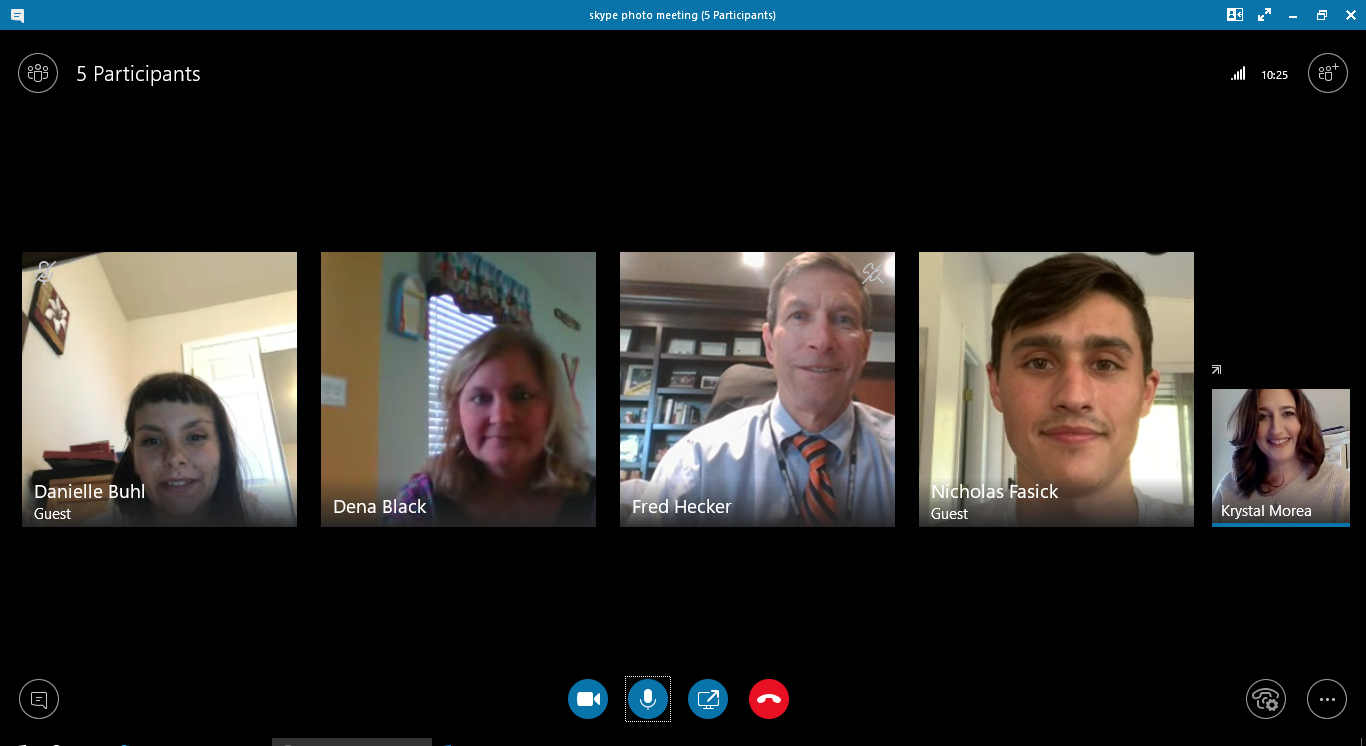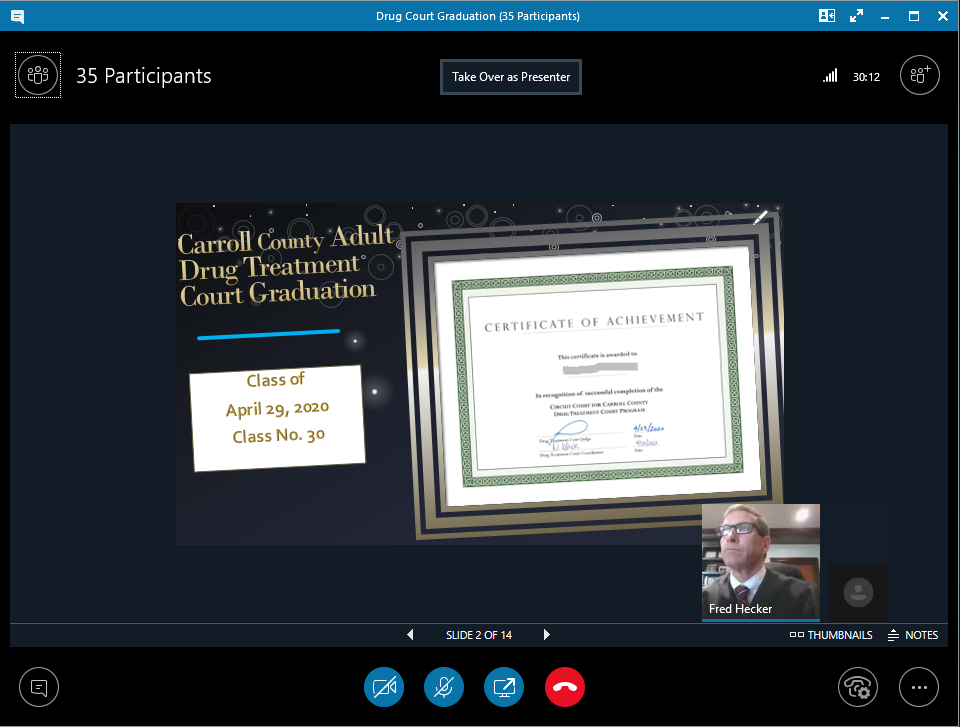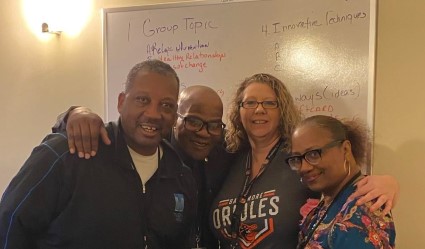187 Harry S. Truman Parkway
Annapolis, Maryland 21401
410-260-1488
Maryland Judiciary shares stories of success amid COVID-19 in honor of National Drug Court Month
The novel coronavirus, COVID-19, pandemic is proving to be one of, if not the most, challenging and unprecedented events in the history of the Maryland Judiciary. Judiciary leadership, judges, and court staff are working tirelessly to maintain essential daily operations amid the global pandemic.
The Maryland Judiciary’s Problem-Solving Courts are paving the way in finding new innovative ways to connect, assist, and support current participants in the Judiciary’s substance abuse, mental health, and veteran’s treatment programs.
Experts say participants may be triggered by the anxiety, uncertainty, and stress brought on by the challenges in facing a global pandemic and as a result, those individuals are more susceptible to potential relapse.
Judges and problem-solving court staff are at the forefront when it comes to leading the courts in finding new ways of using technology to facilitate their dockets and manage treatment courts during these critical and trying times.
Every year, the National Association of Drug Court Professionals (NADCP) recognizes the month of May as National Drug Court Month. Due to COVID-19, the Judiciary is joining NADCP in acknowledging this month by featuring the many recent success stories from various treatment courts throughout Maryland. Each week, the Judiciary will highlight two programs by sharing their stories of success during the COVID-19 crisis.
Carroll County Circuit Court Adult Drug Treatment Court hosts remote docket and graduation
“The use of an online platform for our drug court graduation allowed us to recognize the remarkable achievements of our graduates…”
WESTMINSTER, Md. - Throughout the COVID-19 public health emergency, the Carroll County Circuit Court Adult Drug Treatment Court remains focused and dedicated to continuing all services for its participants. As a result, the court is holding regularly scheduled remote drug treatment court dockets and recently celebrated its participants in a remote video-conference graduation ceremony.

Under County Administrative Judge Fred Hecker’s leadership, the court has greatly benefited from virtual communications and streamlined aspects of daily court operations.
“Among the barriers lifted are the elimination of transportation difficulties getting to and from treatment providers and self-help meetings, and reduction in missed time from work and the need for child care,” said Judge Hecker.
Yet, there are moments of in-person interaction that are greatly missed by Judge Hecker and court staff, especially when it comes to special events like graduations.
“[Although] we will certainly miss the pomp and circumstance of our traditional graduation ceremonies, the use of an online platform for our drug court graduation on April 29, 2020, allowed us to recognize the remarkable achievements of our graduates, without sacrificing the health and safety of the graduates, their families, or drug court staff,” said Judge Hecker.
On April 29, Judge Hecker officiated drug court graduation ceremony, which had 35 participants present during the virtual event.

Baltimore City Circuit Court Drug Treatment Court’s peer recovery specialists help program participants during COVID-19 emergency
BALTIMORE, Md - The COVID-19 pandemic has affected the lives of program participants and court operations at the Baltimore City Circuit Court Drug Treatment Court. As a result, drug treatment court program participants are working hard to remain focused on their recovery journey.
Baltimore City Circuit Court Judge Ellen Heller (Ret.) and Judge Thomas J.S. Waxter, Jr. (Ret.) preside over the docket, which has adopted a public health model that is sensitive to both the current health crisis and the ongoing battle against opioid addiction.
“From the start of the COVID-19 crisis in Maryland, each member of the Drug Treatment Court (DTC) team, including the case manager, probation agents, clinical care coordinators, and the DTC coordinator, in partnership with the peer recovery team, has held case reviews for each participant via conference calls and submitted written reports along with written summaries from the treatment providers,” said Judge Heller. “Integral to the team, as well, are Gregg Solomon, the DTC assistant state’s attorney, and Romel Showell, the assistant public defender, both of whom have been with the DTC for several years. The work of our entire team is critical to the success of the program and to the recovery of the participants.”

The DTC reviews are taking place every other week. The peer recovery support specialists are from Behavioral Health System Baltimore and are new to the DTC team this year. They have enhanced the ability of the entire DTC team to continue providing support services to participants during the COVID-19 emergency. As peers, they provide empathy for and understanding of the substance abuse recovery process, along with advice, mentorship, and friendship. Each participant has a peer.
Drug Court Coordinator Miesha L. Rice also notes that the peer recovery support specialists have also helped participants to address other critical needs during this pandemic, such as food and protective gear.
“The COVID-19 pandemic has, of course, limited the face-to-face contact, but in extreme instances, such as when one of our participants needed food, our peer recovery support specialists were able to intervene, exercising social distancing and safety precautions, including mask coverings, and deliver food to them,” said Rice.
In 2020, the court welcomed four new peer recovery support specialists, who completed intense training to help those in the recovery process.
“They are extremely resourceful and have been able to fill much-needed gaps in services,” said Judge Heller. “They are team players in their own respective way.”
With a support system in place, drug court participants continue making positive strides in the program during this challenging time.
To learn more about the Judiciary’s problem-solving courts, go to:
https://mdcourts.gov/opsc.
To learn more about NADCP’s National Drug Court Month, go to:
https://www.nadcp.org/advocacy/ndcm/.
(May 7, 2020)
